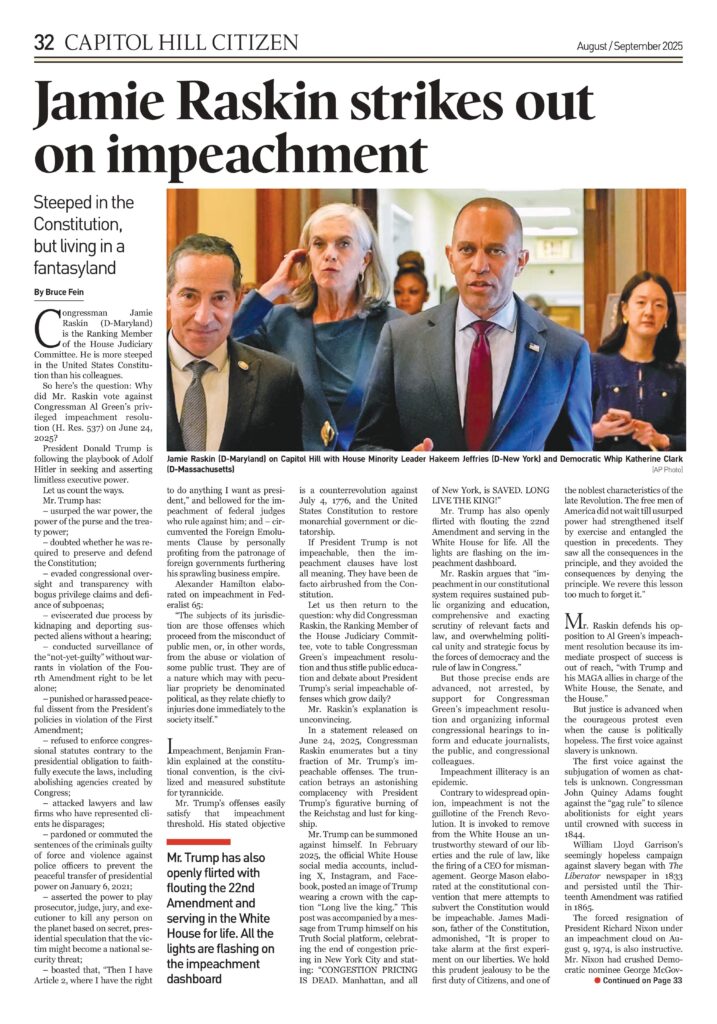Why did Congressman Jamie Raskin (D-Maryland) the Ranking Member of the House Judiciary Committee, vote to table Congressman Al Green’s (D-Texas) impeachment resolution and thus stifle public education and debate about President Trump’s serial impeachable offenses which grow daily?
That’s the question asked by Constitutional lawyer Bruce Fein in the current issue of the Capitol Hill Citizen newspaper (“Jamie Raskin Strikes Out on Impeachment,” August/September 2025 issue, page 32.)
“Mr. Raskin’s explanation is unconvincing,” Fein writes. “In a statement released on June 24, 2025, Congressman Raskin enumerates but a tiny fraction of Mr. Trump’s impeachable offenses. The truncation betrays an astonishing complacency with President Trump’s figurative burning of the Reichstag and lust for kingship.”
“Mr. Trump can be summoned against himself. In February 2025, the official White House social media accounts, including X, Instagram, and Facebook, posted an image of Trump wearing a crown with the caption – “long live the king.”
“Congressman Raskin is more steeped in the United States Constitution than his colleagues,” Fein writes. “So here’s the question: Why did Mr. Raskin vote against Congressman Al Green’s privileged impeachment resolution (H. Res. 537) on June 24, 2025?”
“Mr. Raskin argues that ‘impeachment in our constitutional system requires sustained public organizing and education, comprehensive and exacting scrutiny of relevant facts and law, and overwhelming political unity and strategic focus by the forces of democracy and the rule of law in Congress.’”
“But those precise ends are advanced, not arrested, by support for Congressman Green’s impeachment resolution and organizing informal congressional hearings to inform and educate journalists, the public, and congressional colleagues,” Fein counters. “Impeachment illiteracy is an epidemic. Contrary to widespread opinion, impeachment is not the guillotine of the French Revolution. It is invoked to remove from the White House an untrustworthy steward of our liberties and the rule of law, like the firing of a CEO for mismanagement. George Mason elaborated at the constitutional convention that mere attempts to subvert the Constitution would be impeachable.”
“James Madison, father of the Constitution, admonished – ‘it is proper to take alarm at the first experiment on our liberties. We hold this prudent jealousy to be the first duty of Citizens, and one of the noblest characteristics of the late Revolution. The free men of America did not wait till usurped power had strengthened itself by exercise and entangled the question in precedents. They saw all the consequences in the principle, and they avoided the consequences by denying the principle. We revere this lesson too much to forget it.’”
Fein writes that “Mr. Raskin defends his opposition to Al Green’s impeachment resolution because its immediate prospect of success is out of reach, ‘with Trump and his MAGA allies in charge of the White House, the Senate, and the House.’”
“But justice is advanced when the courageous protest even when the cause is politically hopeless,” Fein argues. “The first voice against slavery is unknown. The first voice against the subjugation of women as chattels is unknown. Congressman John Quincy Adams fought against the gag rule to silence abolitionists for eight years until crowned with success in 1844. William Lloyd Garrison’s seemingly hopeless campaign against slavery began with The Liberator newspaper in 1833 and persisted until the Thirteenth Amendment was ratified in 1865.”
